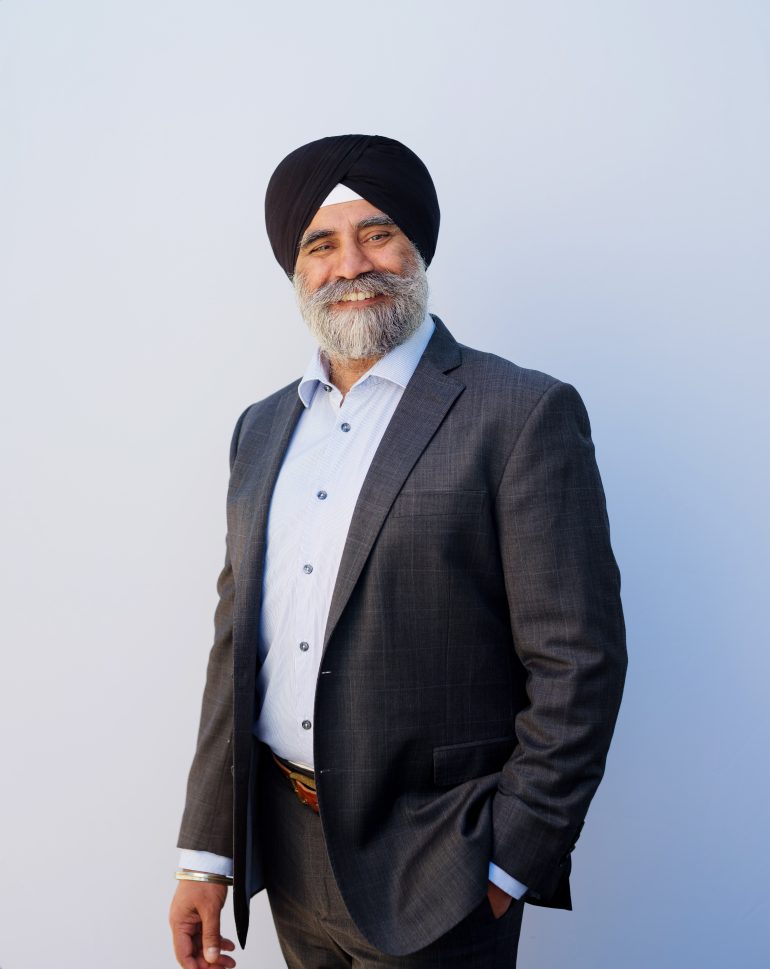By Surbhi Gogia
Baltej Singh Dhillon’s name would be etched in gold if there were a list of trailblazers. From being the first turbaned student in his Canadian high school to winning a landmark legal battle that secured his place as the first turbaned Sikh in the RCMP, his journey is one of merit, perseverance, and an unwavering commitment to service. Recently, he made history again by becoming the second Sikh senator in the Canadian Parliament.
For Dhillon, every milestone has been an opportunity to inspire through dedication and excellence—proving that barriers are meant to be broken not for recognition but for rightful place and purpose. A proud Sikh, he believes that being the first has always given him satisfaction in encouraging youth. However, walking a less traveled road has always come with a greater responsibility of representing his community beyond appearance to its core values of hard work, resilience, and commitment to improving Canada and society.
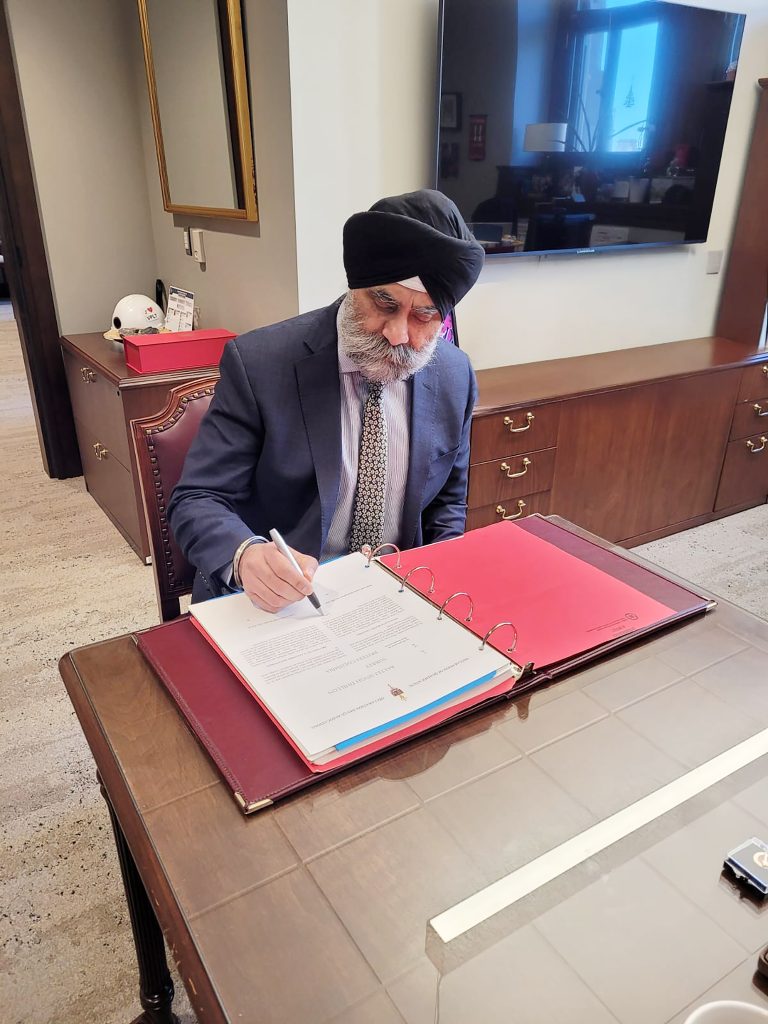
“The pride of being the first Sikh in my field is incredible,’ Senator Dhillon says. “I wanted to represent my Sikh identity not just in appearance, but through my values as well. I consistently went above and beyond my role’s expectations to build a legacy that embodies the hardworking spirit of my community.”
Dhillon’s path was anything but easy. Born in Malaysia, he immigrated to Canada in 1983 with his mother following his father’s passing. He faced immense cultural challenges in a new country, including pressure to conform. He was advised to cut his hair to escape racism. But instead of blending in, he chose to face the consequences, proudly becoming the first turbaned student in his high school.
“Those were tough days, Dhillon reminisces. “Racism was blatant—our house was pelted with eggs, and I was called names. On my first day, some kids stuck a label on my back that read, ‘Go Home, Paki.’ But over time, I recognized that much of it stemmed from ignorance. As I got involved in school activities and volunteering, they began to accept me.”
Through relationship-building, he slowly changed his perceptions. Today, he proudly acknowledges Canada’s progress in tackling racism, even as challenges persist.
After high school, Dhillon pursued criminology at Kwantlen Polytechnic University (KPU) to become a lawyer. Volunteering with the RCMP’s Block Watch program seemed like a strategic step toward law school, but life had other plans.

“While volunteering, I was often asked to translate for South Asian families. They would talk to me comfortably, and I realized how underrepresented our community was in law enforcement. That’s when I decided to become a police officer.”
“I have had the honor and privilege of working with Baltej throughout his 34-year career in policing. Baltej’s natural leadership abilities were evident and recognized through his many promotions in the RCMP and at the Organized Crime Agency of BC. As a colleague, I have always admired Baltej’s intelligence and ability to analyze and assess complex situations and information quickly, be decisive yet consultative in his decision-making, and formulate strategic and clear avenues for continuous advancement. As a friend, I have most admired his integrity, honesty, and love for the community. Baltej is a high-profile member of his community, and the demands and responsibilities placed upon him for social justice have been immense. Unlike many officers, Baltej was not one to turn off his phone at the end of a shift, as he embraced the responsibility of always being available to the needs of his friends, neighbors, and community. Baltej is an excellent addition to the Senate Chamber of Parliament, and he will continue his outstanding service to all Canadians through this appointment.”
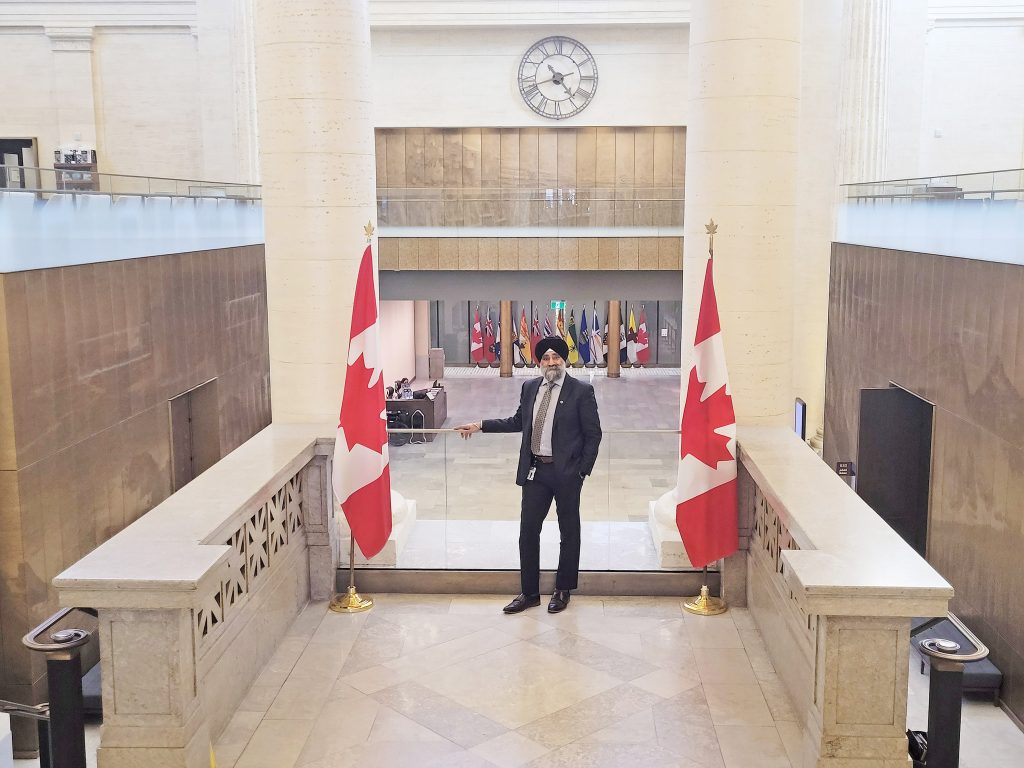
Rob Angco, Operations NCO, CFSEU BC
Encouraged by his seniors, Dhillon applied to the RCMP. He passed the written exams, but the real battle was yet to come. At the time, RCMP regulations required all officers to wear the iconic Stetson hat without religious exemptions. Determined to serve while staying true to his faith, he fought a legal battle that ultimately led to a landmark policy change. In 1991, he graduated from RCMP training, making history as the first Sikh officer to wear a turban while on duty.
“The initial days were tough. If you’re the first, expect many roadblocks. People viewed me with suspicion; they doubted my ability and skills. But once I proved my dedication, I earned their trust.”
Throughout a distinguished 30-year career, Dhillon rose to prominence as a major crime investigator, police interrogator, polygraph examiner, intelligence officer, and emergency planner. He played a crucial role in high-profile cases, including the Air India Flight 182 bombing investigation and the Robert Pickton case.
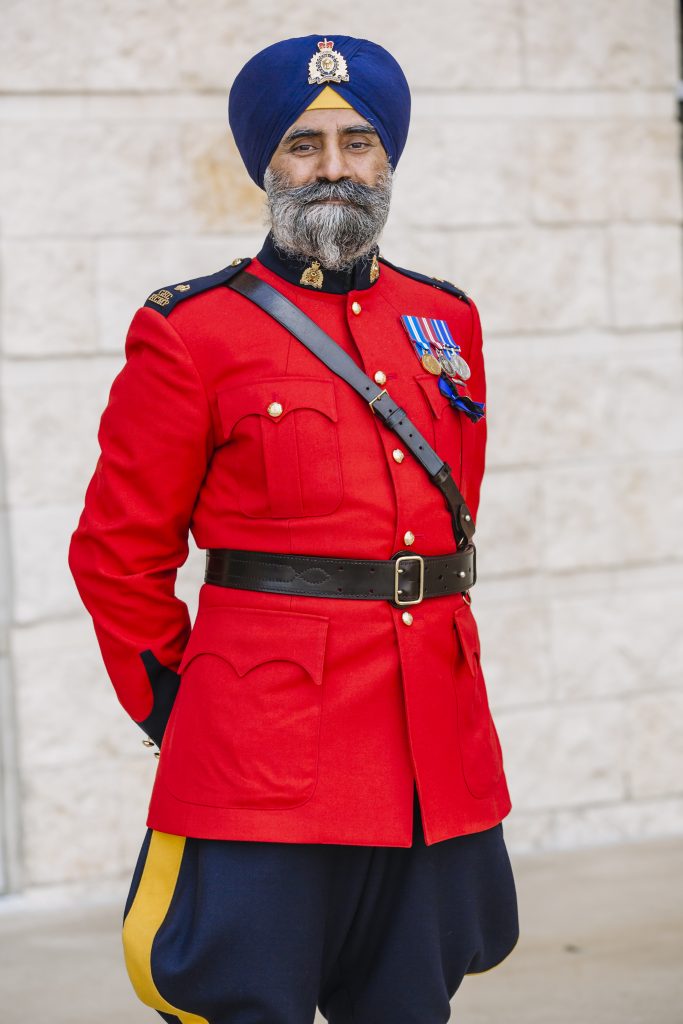
“Among the many roles I held, one of the most challenging was handling cases involving child victims as a polygraph examiner. Investigating the Air India files—going through pictures of children who died in the bombing—was also heartbreaking. I remember cataloging their files; tears would well up in my eyes whenever I saw a child’s face. A senior officer even asked if I wanted to stop, but the work needed to be done.”

Dhillon’s work in gang and gun violence prevention at federal and provincial levels is also unmatched. He has held various leadership positions, such as overseeing the British Columbia RCMP Divisional Emergency Operations Centre and the federal Serious and Organized Crime Intelligence section, both in British Columbia, and establishing and managing intelligence operations at the Provincial Intelligence Centre of British Columbia (now the Real-Time Operations Centre of British Columbia), the first of its kind in Canada.
Since retiring from the RCMP in 2019, he has worked as Program Manager for the Crime Guns Intelligence and Investigations Group with the Combined Forces Special Enforcement Unit of British Columbia (CFSEU-BC), the province’s anti-gang agency.
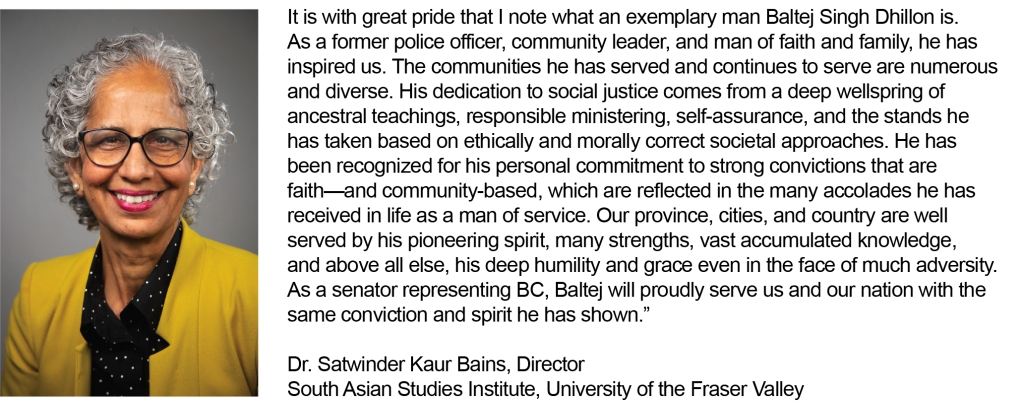
Despite strong law enforcement efforts, gang violence and the illegal drug trade continue to be significant challenges in Canada, particularly in British Columbia. When asked why, Dhillon believes organized crime is one of the greatest threats to public safety today—not only through daily gun violence but also due to the devastating impact of drug overdoses.
“I first met Baltej in the mid-1990s. I was assigned to re-interview some of the major suspects in the Air India Bombing. At that time, I was a senior, experienced interviewer but sadly lacked an understanding of Sikh culture and the political strife that underpinned the bombings. It fell to Baltej to coach and educate me. Baltej was committed to obtaining justice for the 331 murdered victims and their families. We continued to work together off and on until I left policing in 2011. During that time, the RCMP formed a Provincial Interview Team that mainly focused on murder suspects. Baltej and I were part of that team for many years, and I witnessed the skill, dedication, and compassion with which he served British Columbians. It was also during those years that we observed more and more young South Asian boys being drawn into gang life. Baltej poured himself into finding ways to support parents in preventing this from happening. In the end, Baltej proved to be more than just an excellent police officer. His commitment to engaging with the community and working to improve everything he encountered made him quite exceptional. For me, it was a pleasure to know and work with him. For British Columbians, we were fortunate to have such a person dedicate themselves to protecting and bettering our community.”
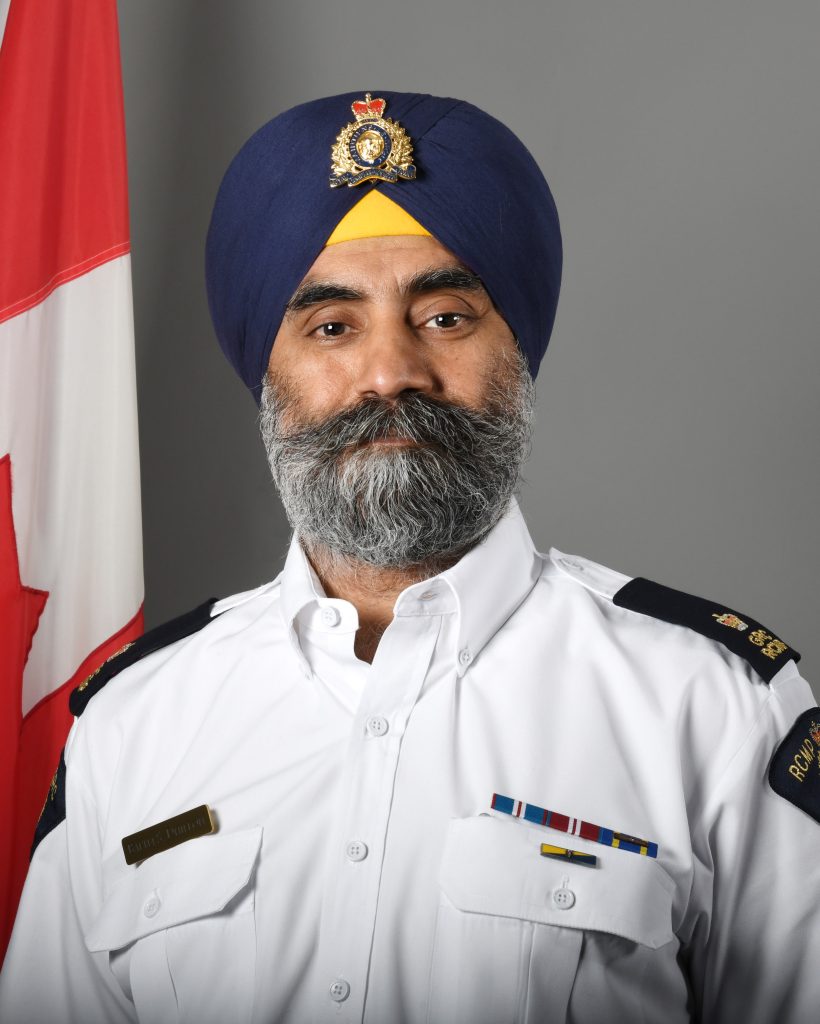
Inspector Don Adam (retired)
“A comprehensive approach is necessary to tackle this issue from multiple avenues and perspectives, addressing the problem from start to finish. While efforts to seize drugs at ports and borders are undeniably important, they do not constitute a complete solution. The real challenge lies in disrupting the wholesalers who supply these drugs,” he explains.
Dhillon also feels that gangs continue to thrive because the consequences of their actions do not outweigh the profits they reap. The “catch and release” policies enable criminals to enter and exit the system quickly. While the Canadian Criminal Code is a valuable tool and enforcement plays a crucial role, he insists it is not the sole solution. “To truly disrupt these operations, we must target their financial structures. Preventing the supply is one aspect, but making the business unprofitable is another. In this province—the only one in the country with such a model—there are approaches to curbing illicit income,” Dhillon adds.

With years of experience working with individuals battling substance abuse, Dhillon stresses that no one becomes a drug addict for the sake of it. “Things happen in people’s lives. There’s generational trauma, and families suffer long before a person turns to drugs,” he says.
Instead of criminalizing drug users, he argues, the focus should be on dismantling the gangs that profit from their suffering.
He has been actively involved in community outreach, conducting workshops in gurdwaras and schools to raise awareness among the youth and parents, helping them recognize and resist the dangers of gangs and drugs. In 2013, he led the Sikh Leadership and Police Committee on Gang Violence, working to implement youth prevention strategies within the Sikh community.
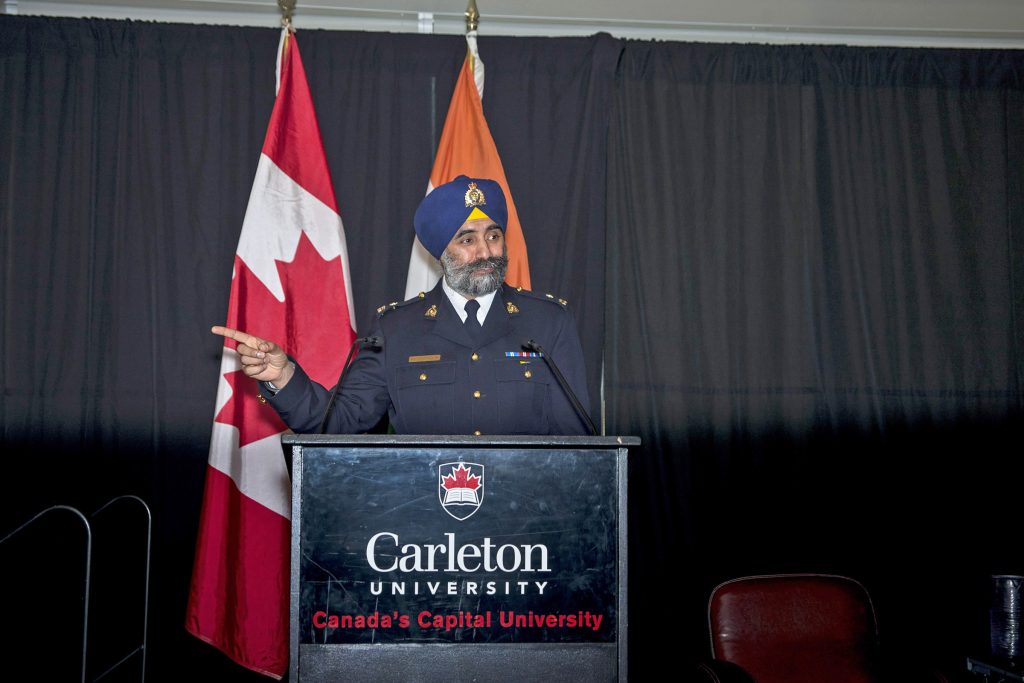
Speaking on the involvement of Indo-Canadian youth in gang violence, Dhillon emphasizes that 95 percent of young people in the community are thriving, leading respectable lives, and making meaningful contributions to society. “It is just a small percentage that is overrepresented,” he notes. Dhillon explains that certain cultural and societal factors play a role within this small at-risk group. “We have created a culture that celebrates wealth and material success. This is not bad—it stems from generations of hard work, sacrifice, and a desire to provide a better life for our children. But when our children grow up seeing only the rewards without understanding the struggle behind them, they develop unrealistic expectations.”
Dhillon believes that communities must ensure that young people are guided toward positive paths. He urges parents to be present in their children’s formative years and engage with them in all aspects of their lives.
Now, Dhillon is set to bring his wealth of experience to the Canadian Senate. He credits Prime Minister Justin Trudeau’s government with changing the senator selection rules in 2016, allowing individuals from diverse backgrounds to apply after a rigorous interview process.
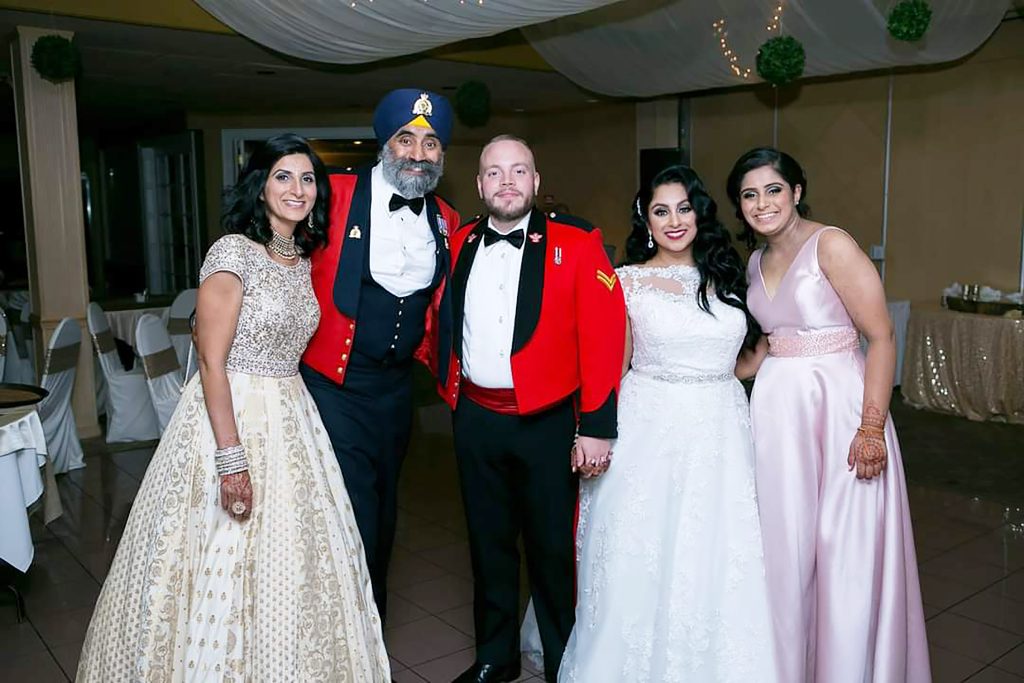
Once appointed by the Governor General, senators play a crucial role in examining legislation, investigating national issues, and representing regional, provincial, and minority interests—key functions in a modern democracy. As a senator, Dhillon hopes to advocate for stronger public safety policies, greater youth engagement, and a more inclusive society. As he steps into the new role, one thing is sure: his impact is far from over.


